A pristine, crystal-clear swimming pool is the centerpiece of any well-designed backyard, inviting relaxation and fun for family and friends. However, sparkling water relies heavily on an efficient and effective filtration system. But with so many types of pool filtration systems out there, how do you know which one will keep your pool water as inviting as a tropical lagoon?
In this article, we will explore the various types of pool filtration systems that keep pool water sparkling clean. We’ll break down how each system works, including its advantages and disadvantages.
You’ll discover which options offer the best balance of maintenance, cost, and effectiveness, helping you choose the perfect system to match your needs. Let’s begin!
Types of Pool Filtration Systems
Pool filtration systems come in several types, each with its own method of removing contaminants and debris. Here are the various types of swimming pool filtration systems and how they work:
Sand filtration systems
Sand filters work by forcing pool water through a tank filled with specially graded sand. As water flows through the sand bed, debris and contaminants are trapped, allowing clean water to return to the pool.
Advantages
Sand filters are cost-effective and easy to use. They’re relatively inexpensive to install and operate, making them popular for residential pools. These systems are also simple to maintain, requiring minimal day-to-day attention.
Disadvantages
These systems need regular backwashing every few weeks to remove trapped particles, which can be time-consuming and wastes water. Sand filters may also be prone to clogging over time, potentially reducing their efficiency.
Best-suited pools for sand filtration systems
Sand filtration systems are ideal for residential pools, particularly small to medium-sized ones. They provide reliable filtration for typical household use and offer a good balance between performance and maintenance requirements.
Sand filters remain a solid choice for pool owners seeking an affordable and straightforward filtration solution. These systems are especially well-suited for pools with moderate use and areas where water conservation is not a primary concern.
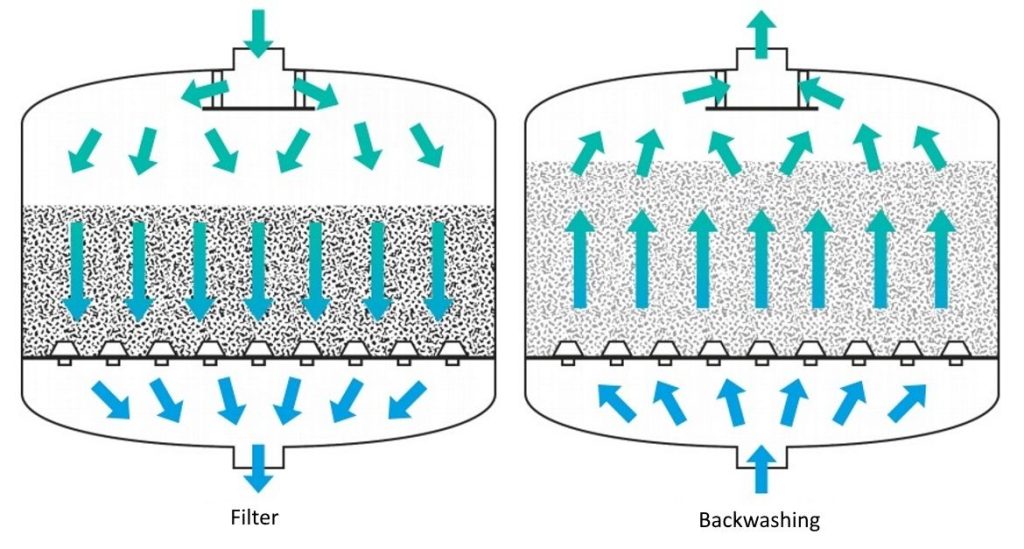
Cartridge filtration systems
Cartridge filtration systems use a cylindrical cartridge made of pleated synthetic materials to filter pool water. As water passes through the cartridge, debris, and particles are trapped in the fine pleats. This design provides a large surface area for filtration, allowing the system to capture very fine particles.
Advantages
Compared to sand filters, cartridge filters can trap finer particles, resulting in clearer water and reduced chemical need. They require less maintenance, don’t need backwashing, saving water and time. Moreover, cleaning typically involves simply removing the cartridge and hosing it down.
Disadvantages
The initial cost of a cartridge filtration system can be higher than that of a sand filter. Cartridges need periodic replacement, usually every 3-5 years, adding to long-term costs. In pools with high debris loads, these filters may require more frequent cleaning to maintain efficiency.
Best-suited pools for cartridge filtration systems
Cartridge filtration systems are ideal for pools that experience a higher debris load, such as those surrounded by trees or in windy areas. The cartridge’s large surface area can handle more debris before requiring cleaning.
These systems are also excellent for pools where water conservation is a priority, as they don’t require backwashing. They’re well-suited for pools where finer filtration is desired, such as those used frequently or by people with sensitivities to water quality.
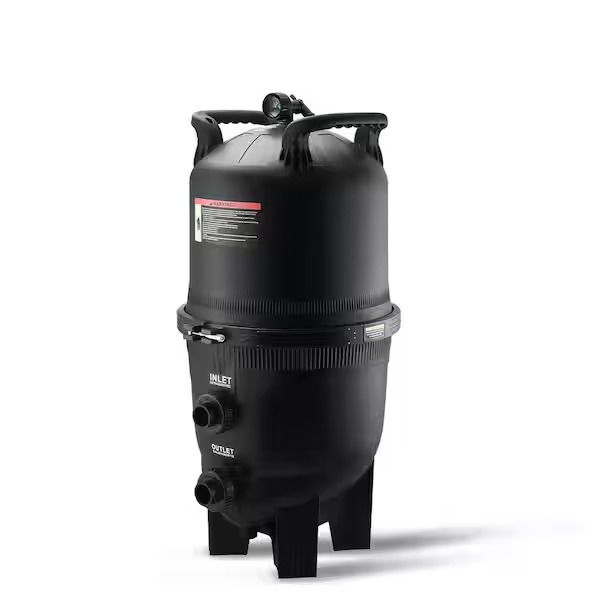
Diatomaceous earth (DE) filtration systems
DE filtration systems use diatomaceous earth, a fine powder made from fossilized algae, as a filter medium. The DE powder coats fabric-covered grids inside the filter tank, acting like a microscopic sieve. As water passes through this DE layer, even particles as small as 2-5 microns are trapped.
Advantages
DE filters offer superior filtration efficiency, removing the smallest particles of any pool filtration system. This high level of filtration can reduce chemical needs and provide crystal-clear water. DE filters also have longer filtration cycles between cleanings.
Disadvantages
DE systems are more complex, expensive, and require more skill to operate and maintain. There are ongoing costs of replacing DE powder after each backwash.
Best-suited pools for DE filtration systems
DE filtration systems are ideal for high-end residential pools where superior water clarity is a priority. They’re also well-suited for commercial pools or competition pools where water quality standards are particularly stringent.
These systems might be a good choice if you are sensitive to water quality, such as those with allergies or skin sensitivities. They’re also beneficial in situations where minimizing chemical use is desired, as their efficient filtration can reduce the need for sanitizers.
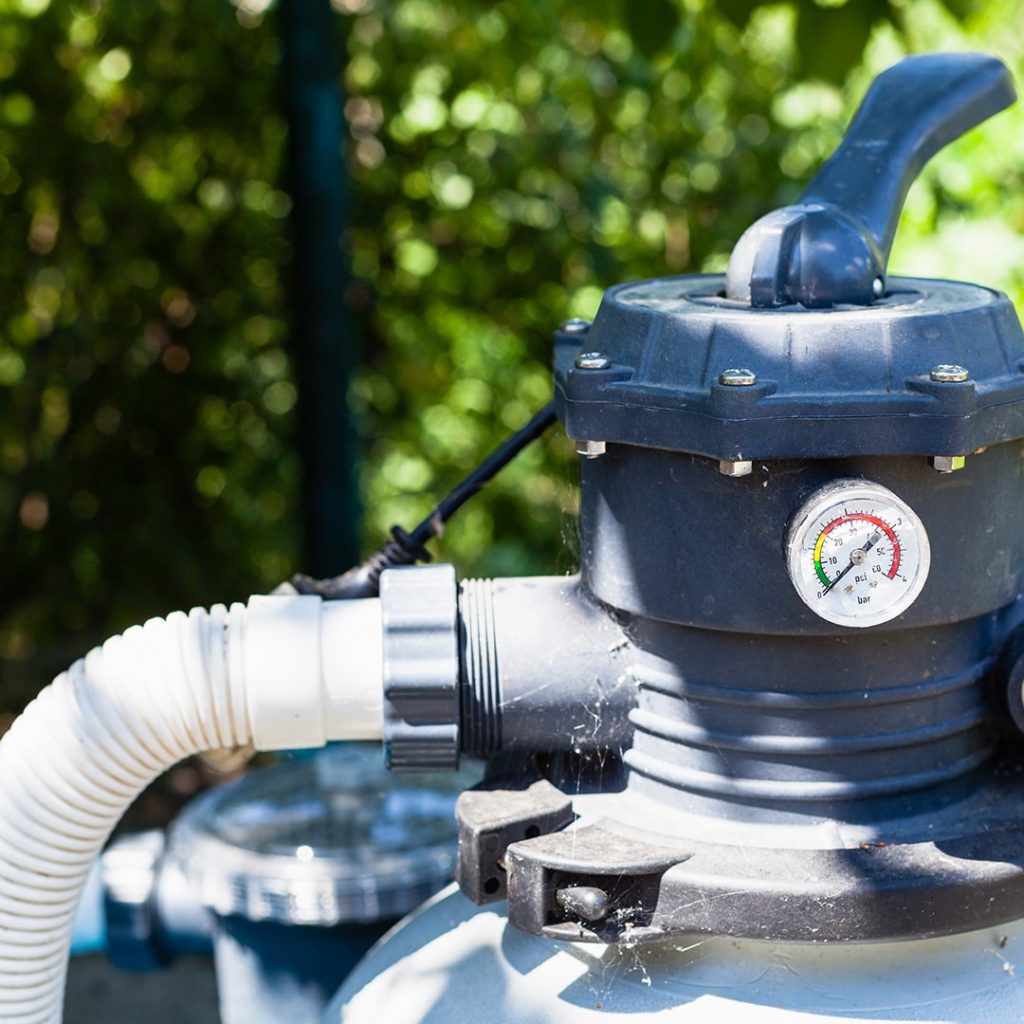
Saltwater chlorination systems
Saltwater chlorination systems use dissolved salt to produce chlorine through electrolysis. As water passes through the chlorinator cell, salt is converted into hypochlorous acid, which sanitizes the pool.
While not a filtration system itself, saltwater chlorination works alongside traditional filters. It helps maintain water clarity by continuously producing sanitizer, reducing the load on the main filtration system.
Advantages
Saltwater systems require fewer chemicals, resulting in easier maintenance and lower operating costs. The water feels softer and gentler on skin, eyes, and swimwear compared to traditional chlorine pools.
These systems provide more consistent chlorine levels, possibly reducing the risk of algae growth. This might provide improved water quality and a more pleasant swimming experience.
Disadvantages
The initial setup cost for saltwater systems is higher than traditional chlorine systems. There’s also potential for corrosion of metal components in and around the pool, especially if not properly maintained.
In addition, salt cells require periodic cleaning and eventual replacement, adding to long-term maintenance costs. Some local regulations may restrict the use of saltwater systems due to concerns about salt discharge.
Best-suited pools for saltwater chlorination systems
Saltwater chlorination systems are excellent for residential pools, particularly those used frequently. They’re ideal for households looking to reduce chemical handling and storage.
These systems are also perfect for your pool if you’re sensitive to chlorine. If you have children or suffer from allergies, you might find the gentler water quality of saltwater pools more comfortable.
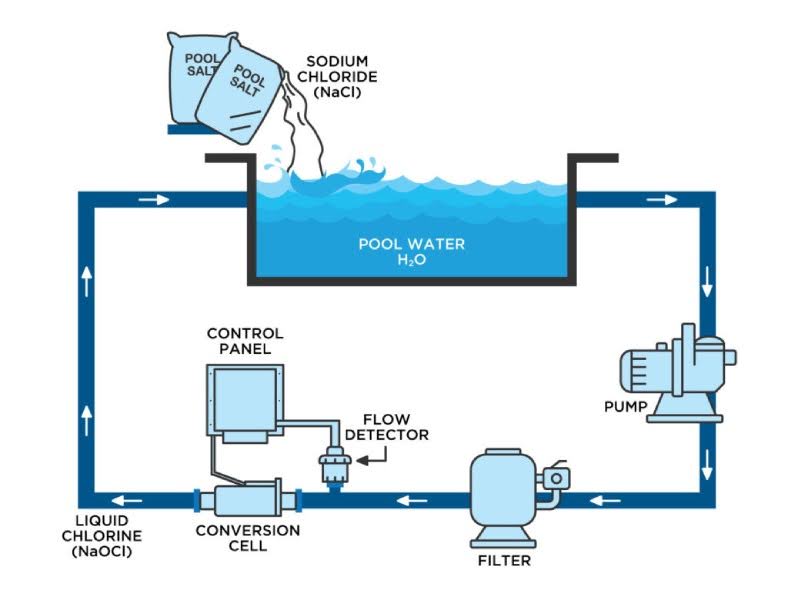
UV filtration systems
UV filtration systems use ultraviolet light to sanitize pool water. As water flows through a chamber, it’s exposed to UV-C light, which possibly destroys bacteria, viruses, and other microorganisms. This process inactivates harmful pathogens, preventing them from reproducing.
Advantages
UV systems provide effective sterilization without adding chemicals to the water. They might offer continuous protection against waterborne pathogens, reducing the need for traditional sanitizers. UV filtration is also eco–friendly and doesn’t create harmful by-products.
Disadvantages
UV filters do not remove physical debris or dissolved contaminants from the water. They require supplementary filtration systems to handle particles and maintain water clarity. Also, UV lamps need periodic replacement, adding to maintenance costs.
Best-suited pools for UV filtration systems
These systems are ideal for pools with high bacterial loads or those prone to algae growth. They’re excellent for eco-friendly pool systems and indoor pools where air quality is a concern. UV filters also suit pools used by people sensitive to traditional chemical sanitizers.
Due to high bather loads, UV systems might greatly benefit public pools and spas. They’re also well-suited for therapy pools in healthcare settings where water quality is important.
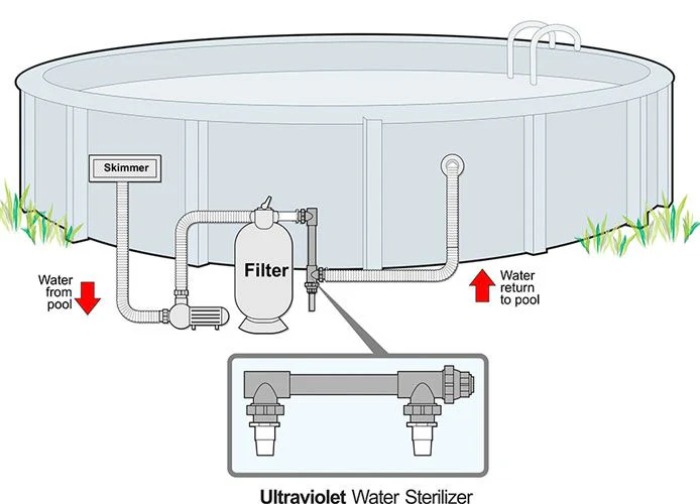
Ozone filtration systems
Ozone filtration systems inject ozone gas into the pool water. As a potent oxidizer, ozone might eliminate bacteria, viruses, and other contaminants upon contact. It might also break down organic compounds and help to coagulate small particles, which makes them easier to filter out.
Advantages
Ozone might be a highly effective sanitizer, capable of killing a wide range of pathogens quickly. It might reduce the need for traditional chemicals, leading to better water quality. After sanitizing, ozone potentially leaves no residual taste or odor and reverts back to oxygen.
Disadvantages
Ozone systems have a high initial cost and can be complex to install and maintain. They require additional filtration systems to remove physical debris and maintain water clarity. Ozone might be harmful if not properly managed, necessitating careful monitoring and control.
Best-suited pools for ozone filtration systems
Ozone filtration systems are ideal for large commercial pools with high bather loads. They’re well-suited for water parks, hotel pools, and other high-traffic aquatic facilities. These systems can handle the increased sanitization demands of heavily used pools.
Furthermore, ozone is an excellent option for high-end residential pools aiming for superior water quality. It’s particularly beneficial for pools located in regions with stringent chemical regulations or those prioritizing eco-friendly solutions. Additionally, ozone is especially suited for indoor pools, as it may reduce chloramines.

Combination filtration systems
Combination filtration systems integrate multiple purification methods, including mechanical filtration, UV treatment, and ozone, to deliver superior water quality. By simultaneously addressing various aspects of purification, these systems are highly effective in managing diverse water quality challenges, making them ideal for large commercial pools and specialized applications.
However, combination systems come with higher costs and more complex maintenance due to their multiple components. Despite these drawbacks, they offer unmatched water quality and can be customized to meet specific environmental factors or hygiene requirements.
Moreover, combination filtration systems present a sophisticated solution for pools that face demanding conditions or require exceptional water purity. They outperform single-method approaches and offer a comprehensive solution to complex water quality needs.
Conclusion
We have explored various pool filtration systems, from cost-effective sand filters to efficient cartridge systems and powerful diatomaceous earth filters. Each option offers unique benefits to suit different pool needs and budgets.
By exploring these types of pool filtration systems, you’ve gained valuable insights into how they work and their respective advantages. As pointed out, the right filtration system is crucial for maintaining a clean, safe, and enjoyable pool.
As you select the ideal filtration system for your pool, weigh your unique needs, maintenance preferences, and long-term costs to ensure a choice that enhances functionality and enjoyment. Choose wisely!
